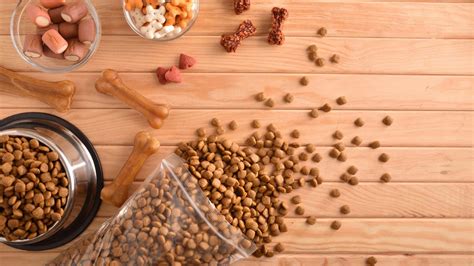Introduction
Pets have become an integral part of our families, providing companionship, love, and emotional support. As responsible pet owners, it is crucial to ensure our furry friends receive a well-balanced diet that meets their nutritional needs. Minerals play a vital role in the overall health and well-being of our pets, impacting various bodily functions and ensuring optimal development and vitality.

Importance of Minerals in Pet Nutrition
Minerals are inorganic substances that are not produced by the body and must be obtained through the diet. They are essential for a multitude of cellular processes, including:
- Bone and teeth formation
- Muscle function
- Energy metabolism
- Immune system function
- Fluid balance
A deficiency or imbalance of minerals can lead to a range of health issues, such as anemia, bone deformities, neurological problems, and impaired immune function.
Common Minerals in Pet Food
The most common minerals found in pet food include:
Calcium
- Required for strong bones and teeth
- Supports muscle function and nerve transmission
- Recommended intake: 0.6-1.3% of the dry matter diet
Phosphorus
- Works with calcium to promote bone health
- Involved in energy metabolism and protein synthesis
- Recommended intake: 0.4-0.8% of the dry matter diet
Potassium
- Regulates fluid balance and blood pressure
- Supports muscle function and nerve transmission
- Recommended intake: 0.3-0.6% of the dry matter diet
Sodium
- Essential for fluid balance and maintaining blood pressure
- Recommended intake: 0.1-0.4% of the dry matter diet
Magnesium
- Supports bone development and muscle function
- Involved in energy metabolism and protein synthesis
- Recommended intake: 0.1-0.2% of the dry matter diet
Mineral Supplementation for Pets
In most cases, commercially prepared pet foods provide sufficient levels of minerals to meet the nutritional needs of healthy pets. However, certain situations may require mineral supplementation, such as:
- Home-prepared diets: These diets may not provide a balanced mineral profile.
- Growing puppies and kittens: Young animals have higher mineral requirements for growth and development.
- Pregnant or lactating pets: Mineral needs increase during pregnancy and nursing.
- Pets with specific health conditions: Some health issues can affect mineral absorption or metabolism.
Mineral Toxicity in Pets
While minerals are essential for health, excessive intake can lead to toxicity. Signs of mineral toxicity include:
- Vomiting
- Diarrhea
- Seizures
- Muscle tremors
- Skin lesions
It is crucial to avoid over-supplementation and consult with a veterinarian before giving your pet any mineral supplements.
Table 1: Recommended Mineral Intake for Dogs
| Weight (lbs) | Calcium (mg) | Phosphorus (mg) | Potassium (mg) |
|---|---|---|---|
| 5-15 | 300-900 | 200-600 | 150-450 |
| 15-30 | 600-1,800 | 400-1,200 | 300-900 |
| 30-50 | 900-2,700 | 600-1,800 | 450-1,350 |
| 50-70 | 1,200-3,600 | 800-2,400 | 600-1,800 |
Table 2: Recommended Mineral Intake for Cats
| Weight (lbs) | Calcium (mg) | Phosphorus (mg) | Potassium (mg) |
|---|---|---|---|
| 3-8 | 180-540 | 120-360 | 90-270 |
| 8-12 | 360-1,080 | 240-720 | 180-540 |
| 12-15 | 540-1,620 | 360-1,080 | 270-810 |
Market Insights
The global pet nutrition market is expected to reach a size of over $100 billion by 2025. This growth is being driven by factors such as increasing pet ownership, rising disposable income, and growing awareness of pet health and nutrition.
The demand for premium pet foods and supplements with high-quality ingredients, including balanced mineral profiles, is also increasing. As a result, many pet food manufacturers are investing in research and development to improve the nutritional value of their products.
Future Trends
The future of pet nutrition is expected to see a continued focus on personalized nutrition, with pet foods tailored to specific health conditions and individual needs. There will also be a growing emphasis on sustainability, with more pet food manufacturers using environmentally friendly packaging and ingredients.
Case Study: Personalized Mineral Supplementation for a Senior Dog
Patient: 12-year-old Labrador Retriever with osteoarthritis
Symptoms: Stiffness, difficulty moving, reluctance to go on walks
Diagnosis: Veterinarian diagnosed the patient with osteoarthritis and recommended a personalized mineral supplement plan
Results: After 6 months of supplementation, the patient showed significant improvement in mobility and willingness to exercise. The veterinarian attributed this improvement to the balanced mineral intake, which supported the patient’s bone health and muscle function.
Conclusion
Minerals play a crucial role in the health and well-being of our beloved pets. By understanding the importance of minerals and their role in various bodily functions, pet owners can make informed decisions about their pets’ nutrition. If necessary, mineral supplementation can help address specific health conditions and improve the quality of life for our furry companions. As the pet nutrition industry continues to advance, we can expect even more innovative products and services designed to meet the ever-changing needs of our cherished animals.





















